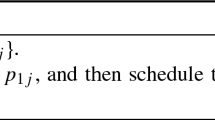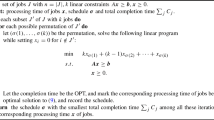Abstract
We study the parameterized complexity of a set of flow-shop scheduling problems in which the objective is to maximize the weighted number of just-in-time jobs. Our analysis focuses on the case where the number of due dates is considerably smaller than the number of jobs and thus can be considered as a parameter. We prove that the two-machine problem is W[1]-hard with respect to this parameter, even if all processing times on the second machine are of unit length, while the problem is in XP when parameterized by the number of machines combined with the number of different due dates. We then move on to study the tractability of the problem when combining the number of different due dates with either the number of different weights or the number of different processing times on the first machine. We prove that in both cases the problem is fixed-parameter tractable for the two-machine case and is W[1]-hard for three or more machines.


Similar content being viewed by others
References
Arkin, E. M., & Silverberg, E. L. (1987). Scheduling jobs with fixed start and finish times. Discrete Applied Mathematics, 18, 1–8.
Baker, K. R., & Scudder, G. D. (1990). Sequencing with earliness and tardiness penalties: A review. Operations Research, 38, 22–36.
Bodlaender, H. L., & Fellows, M. R. (1995). W[2]-hardness of precedence constrained $k$-processor scheduling. Operations Research Letters, 18(2), 93–97.
Carlisle, M. C., & Lloyd, E. L. (1995). On the $k$-coloring of intervals. Discrete Applied Mathematics, 59, 225–235.
Čepek, O., & Sung, S. C. (2005). A quadratic time algorithm to maximize the number of just-in-time jobs on identical parallel machines. Computers and Operations Research, 32, 3265–3271.
Choi, B. C., & Yoon, S. J. (2007). Maximizing the weighted number of just-in-time jobs in flow-shop scheduling. Journal of Scheduling, 10, 237–243.
Cygan, M., Fomin, F. V., Kowalik, Ł., Lokshtanov, D., Marx, D., Pilipczuk, M., et al. (2015). Parameterized algorithms. New York: Springer.
Downey, R.G., & Fellows, M.R. (1992). Fixed-parameter intractability. In Proceedings of the 7th annual structure in complexity theory conference (COCO ’92) (pp. 36–49).
Downey, R. G., & Fellows, M. R. (2013). Fundamentals of parameterized complexity. New York: Springer.
Elalouf, A., Levner, E., & Tang, H. (2013). An improved FPTAS for maximizing the weighted number of just-in-time jobs in a two-machine flow shop problem. Journal of Scheduling, 16(4), 429–435.
Fellows, M. R., & McCartin, C. (2003). On the parametric complexity of schedules to minimize tardy tasks. Theoretical Computer Science, 298(2), 317–324.
Flum, J., & Grohe, M. (1998). Parameterized complexity theory. New York: Springer.
Fullerton, R. R., & McWatters, C. S. (2001). The production performance benefits from JIT implementation. Journal of Operations Management, 29, 81–96.
Graham, R. L., Lawler, E. L., Lenstra, J. K., & Kan, A. H. G. R. (1979). Optimization and approximation in deterministic sequencing and scheduling: A survey. Annals of Discrete Mathematics, 3, 287–326.
Held, M., & Karp, R. M. (1962). A dynamic programming approach to sequencing problems. Journal of the Society for Industrial and Applied Mathematics, 10(1), 196–210.
Hermelin, D., Kubitza, J.M., Shabtay, D., Talmon, N., & Woeginger, G. (2015). Scheduling two competing agents when one agent has significantly fewer jobs. In Proceedings of the 10th international symposium on parameterized and exact computation (IPEC ’15).
Kovalyov, M. Y., Ng, C. T., & Cheng, T. C. E. (2007). Fixed interval scheduling: Models, applications, computational complexity and algorithms. European Journal of Operational Research, 178, 331–342.
Lann, A. Y., & Mosheiov, G. (1996). Single machine scheduling to minimize the number of early and tardy jobs. Computers and Operations Research, 23, 769–781.
Mnich, M., & van Bevern, R. (2018). Parameterized complexity of machine scheduling: 15 open problems. Computers and Operations Research, 100, 254–261.
Mnich, M., & Wiese, A. (2015). Scheduling meets fixed-parameter tractability. Mathematical Programming, 154(1), 533–562.
Niedermeier, R. (2006). Invitation to Fixed-Parameter Algorithms. Oxford: Oxford Univerity Press.
Shabtay, D. (2012). The just-in-time scheduling problem in a flow-shop scheduling system. European Journal of Operational Research, 216(3), 521–532.
Shabtay, D., & Bensoussan, Y. (2012). Maximizing the weighted number of just-in-time jobs in several two-machine scheduling systems. Journal of Scheduling, 15(1), 39–47.
Shabtay, D., & Steiner, G. (2012). Scheduling to maximize the number of just-in-time jobs: A survey. In R. Z. Rios-Mercado & Y. A. Rios-Solis (Eds.), Just-In-Time systems. New York: Springer.
van Bevern, R., Mnich, M., Niedermeier, R., & Weller, M. (2015). Interval scheduling and colorful independent sets. Journal of Scheduling, 18(5), 449–469.
van Bevern, R., Niedermeier, R., & Suchý, O. (2016). A parameterized complexity view on non-preemptively scheduling interval-constrained jobs: few machines, small looseness, and small slack. Journal of Scheduling, 20(3), 255–264.
White, R. E., & Prybutok, V. (2001). The relationship between JIT practices and type of production system. Omega, 29, 113–124.
Acknowledgements
This research was partially supported by Grant No. 2016049 from the United States-Israel Binational Science Foundation (BSF). The first author’s work was supported by the People Programme (Marie Curie Actions) of the European Union’s Seventh Framework Programme (FP7/2007-2013) under REA Grant 631163.11, and by the Israel Science Foundation (Grant 551145/14). We would also like to thank the reviewers for their insightful comments on this paper, comments which improved the paper dramatically.
Author information
Authors and Affiliations
Corresponding author
Additional information
Publisher's Note
Springer Nature remains neutral with regard to jurisdictional claims in published maps and institutional affiliations.
Rights and permissions
About this article
Cite this article
Hermelin, D., Shabtay, D. & Talmon, N. On the parameterized tractability of the just-in-time flow-shop scheduling problem. J Sched 22, 663–676 (2019). https://doi.org/10.1007/s10951-019-00617-7
Published:
Issue Date:
DOI: https://doi.org/10.1007/s10951-019-00617-7




